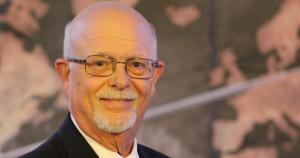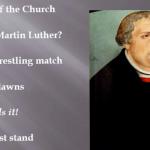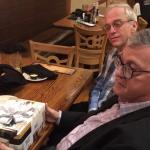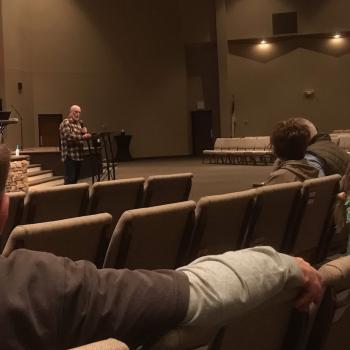Early on, while writing for Patheos, I decided to highlight some great works from some of my acquaintances at times. I’ve enjoyed working with my Dad, Vernell Ingle, to offer the Reformation pieces over the last couple weeks.
JVI: Reformation 500th Anniversary: Ideals of the Magisterial Reformers
VI: Reformation 500th Anniversary: Prof. Vernell Ingle shares Martin Luther’s Narrative (a/v)
Last week, in my writing, I offered a fun glimpse into a presentation by Thomas Woodward, the President of the C.S. Lewis Society.
Aslan Acrostic: Dr. Thomas Woodward shares the story of C.S. Lewis
This week, and in the next couple, my Dad is offering a seminary paper that he wrote on some key works of C.S. Lewis.[1]
In my first master’s degree, I focused on social scientific research. Professors directed us to keep from interacting personally. The work and research should speak for itself. In my second master’s degree I learned to interact personally with Theology.
My Dad does just that in this piece. He shares how his story intersects with his readings of C.S. Lewis.
 JVI, Prof. Vernell Ingle, Messenger College Faculty Chair | 08.10.18
JVI, Prof. Vernell Ingle, Messenger College Faculty Chair | 08.10.18
Please take time to enjoy a closer look at the writings of Lewis, and a challenge to us all, to allow ourselves to personally engage with great Christian thinkers.
Introduction
C.S. Lewis is one of the greatest minds of Christianity this century. “C.S. Lewis will be remembered as one of the most important thinkers of the twentieth century.”[2] The initial exposure to Lewis came in the late 1970’s. After becoming acquainted with John Bunyan’s classic Pilgrim’s Progress, for reading to the children, The Chronicles of Narnia were brought to our attention. Through the years with all five of our children we have been through both of these classic children’s works many times. The Chronicles of Narnia is still an integral part of our family library and are now in the homes of our two married sons awaiting another generation of imagination.
Lewis was the first mystic that aroused my interest
Lewis was the first mystic that aroused my interest, although then I did not know the true meaning of the term mystic, especially in the Christian realm. The brilliant imagination of the Narnia series whet the appetite to search for other works by Lewis.
Attracted by Lewis’ imagination, I procured his work The Space Trilogy, which includes Perelandra, That Hideous Strength, and Out of the Silent Planet. This was more of an adult fantasy in contrast to the children’s Narnia series. There was an attempt to read this series to my older sons later on, but it was too deep for them and was frightening, especially since the readings took place at night. They later read the series on their own when they were much older.
One other work that I read to the boys later on, rather amusing as well as insightful, was The Screwtape Letters. We have read this book repeatedly throughout the years. Other works that have been read early on were Mere Christianity and The Great Divorce.
Being a sanguine in temperament, the intellect plays a minor role in relation to the emotions. Therefore, the bulk of my reading was from popular resources and or study related materials for sermons and lessons. Thus, one of the attractions to Lewis was his convincing intellect.
Mere Christianity was the first non-fiction work of his read. It made an impact on my Christianity in the sense that it created a craving for greater spiritual depth. For the first time cerebral Christianity attracted me. I was raised in classical Pentecost. We do not emphasize the intellectual side of our faith. In some circles, we even frown upon it, but nonetheless our faith is both real and alive.
The works of Lewis stir up a new hunger
This was a new hunger. Therefore, it was a new experience. Rather than dampen my Pentecostal experience, it deepened it. Truly, C.S. Lewis opened the door to a whole new world for my personal, spiritual experience.
That is why I readily selected Lewis for this paper. Through the years I have read 13 of his works. For this paper I read again Mere Christianity, which seems to be his definitive work, and the first book of the Narnia series The Lion, the Witch, and the Wardrobe.
New works for me that I read for this paper were The Abolition of Man, Miracles, and his autobiography Surprised by Joy. Through the years we have also viewed the two movies about his marriage and subsequent death of his wife later in his life, called Shadowlands. There is the older English version and the newer American version starring Anthony Hopkins as Lewis. Both drama presentations vividly portray Lewis’ personal struggle with his faith and futility of life. It is a powerful and emotional drama.
For this paper, the reflections will center on excerpts from the five works just read. Each section reflects one of these works which represent the diversity of Lewis’ writings. Search for Joy (his autobiography), Natural versus Supernatural (Miracles), Men Without Chests (Abolition of Man), The Stone Table (The Lion, The Witch, and The Wardrobe), and Lunatic, Madman, Fiend, or God? (Mere Christianity).
Search For Joy
In his book Surprised by Joy, C.S. Lewis relates the story of his early life to his conversion. He was born in Belfast, Ireland in 1898. His father was a solicitor and his mother was a minister’s daughter. He was the youngest of two brothers by about three years.
Both of Lewis’ parents were educated and are intellectuals, by the standards of his time. He calls them bookish or clever people. His mother started Lewis in both French and Latin before her death. Both parents were avid readers. This seemed to set the tone for Lewis’ intellect and later scholarship.[3]
At least his parents took Lewis to church. There was an outward form only, but virtually no religious experience occurred in those early years. “I was taught the usual things and made to say prayers and in due time taken to church. I naturally accepted what I was told but I cannot remember feeling much interest in it.”[4]
Lewis claimed that although his childhood was imaginative, it lacked wonder, and he abhorred emotions. He admitted there was both a dislike and a distrust of emotion. This left him with the intellect, so he became an avid reader himself, early on.
Basic Questions:
1. Vernell Ingle had been saved almost his entire life, called to the ministry at age 9, highly educated, and very active in ministry by the time he wrote this piece. However, he candidly shares how interacting with Lewis’ writings challenges him. Are there any people, experiences, or seasons of your life that have challenged you to mature in your Christian faith?
2. What benefits would you see in reading a vast amount of works by a particular Christian author? Is it possible for us to share our journey with others in such ways?
3. Do you relate in any way to the childhood of Lewis, as shared so far in this post? Have you ever considered yourself religious, but not truly experiencing the fulness of the faith? Have you ever distrusted your emotions to the point that you relied on your intellect too much?
[1] Vernell Ingle, “Reflections on the Life and Words of C.S. Lewis,” (paper presented in Spiritual Formation of the Minister, Assemblies of God Theological Seminary, Springfield, MO, August 11, 1998).
[2] Richard J. Foster and James Bryan Smith, ed., Devotional Classics: Selected Readings for Individuals and Groups (San Francisco: Harper Collins, 1990), 7.
Amazon: Devotional Classics Revised Edition 2005
[3] C.S. Lewis, Surprised By Joy: The Shape of My Early Life (London: Harcourt Brace and Company, 1955), 3-4.
Amazon: Surprised by Joy
[4] Ibid., 7.













